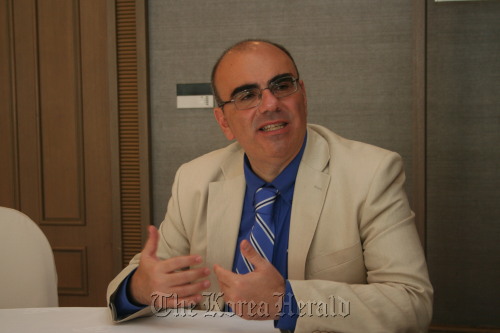A prominent Greek university professor and economist has warned South Korea not to repeat his country’s economic mistakes, calling the plan to give free school meals to all students “irresponsible.”
“Is it a matter of equality? Of course not. Why middle class Seoul citizens, maybe with no children, should pay for free lunch by children of rich families (I cannot understand),” University of Athens professor Aristides N. Hatzis told The Korea Herald on Wednesday.
“Is it a matter of equality? Of course not. Why middle class Seoul citizens, maybe with no children, should pay for free lunch by children of rich families (I cannot understand),” University of Athens professor Aristides N. Hatzis told The Korea Herald on Wednesday.

Making reference to the political climate in Greece and elsewhere, he said that it was important for voters to be made aware of the long-term consequences of irresponsible government spending.
“It is very difficult for parties to keep a fiscally conservative position for such a long time. This means significant political cost in the elections,” he said.
The professor, who served as a member of the European Association of Law & Economics and has written for the New York Times, added that as Korea continues to advance it should aim to take the best from the American and European economic models rather than choosing between the two.
“For example, (in) the United States there is capital and labor mobility that is much better than in Europe. In Europe … there are some cases of welfare states that are so bad as in Greece. I think also that the system of checks and balances of the U.S. constitution are much better than any other European state,” he said.
Hatzis, who was in Seoul to give a seminar on the dangers welfare populism, stressed he was not against the welfare state, but that it was a dangerous signal when “money goes to people that are not in need of help.”
On Tuesday, he told a gathering at The Plaza Hotel in Gwanghwamun that it was “difficult to fail as miserably as Greece, but it is very easy to fail in the same way.”
The seminar, “Welfare Populism: Lessons from Greece,” was hosted by the Center for Free Enterprise, a Seoul-based free market think tank.
Hatzis also outlined at the seminar how Greece had once been an economic success story, with an annual average growth rate between 1929 and 1980 of 5.2 percent, the highest in the world.
He said that Greece’s path to ruin began with the election of PASOK (Panhellenic Socialist Movement) in 1981, the country’s first social democratic government. PASOK is the current ruling party of Greece.
“Today’s degradation of Greece is the result of PASOK in two important aspects. First, PASOK’s actual economic policy was catastrophic since it led to a mixture of a gigantic but inefficient welfare and overregulation,” he said.
The country’s opposition conservative party, he added, competed for votes by following similar high-spending populist polices, adding fuel to the fire.
Hatzis also said that corruption and tax evasion continue to be endemic in his country, the former costing the country 20-30 billion euros a year.
“A swimming pool is an indication of wealth so the Greek revenue service uses this to detect tax cheaters. In 2009, only 364 persons declared that they have a pool in their house. Satellite photos revealed that house pools in Athens were actually 16, 974,” he said.
The seminar was also addressed by former floor leader of the Grand National Party Rep. Kim Moo-sung and Professor Ha Sung-kun of Yonsei University.
Kim said that following the road of welfare populism would lead to economic disaster and that increased welfare provision going forward would require increased taxes.
“Both the conservative party and the liberal party in Korea are making false promises and this, I believe, is cheating the public. To establish a welfare state, individuals should have to pay more tax in the future, but politicians are not making this obvious,” he said.
Hatzis was due to address the National Assembly Thursday, following an impromptu invitation by the Finance Ministry at the request of President Lee Myung-bak.
By John Power (john.power@heraldcorp.com)







![[KH Explains] How should Korea adjust its trade defenses against Chinese EVs?](http://res.heraldm.com/phpwas/restmb_idxmake.php?idx=644&simg=/content/image/2024/04/15/20240415050562_0.jpg&u=20240415144419)











![[Today’s K-pop] Stray Kids to return soon: report](http://res.heraldm.com/phpwas/restmb_idxmake.php?idx=642&simg=/content/image/2024/04/16/20240416050713_0.jpg&u=)